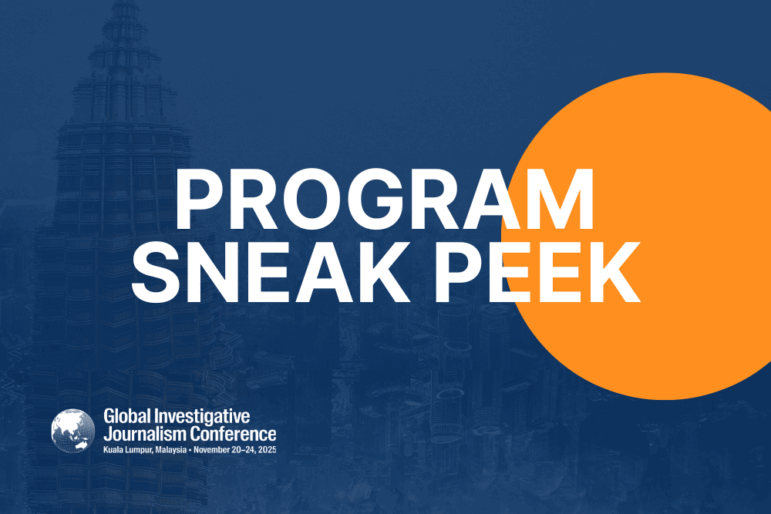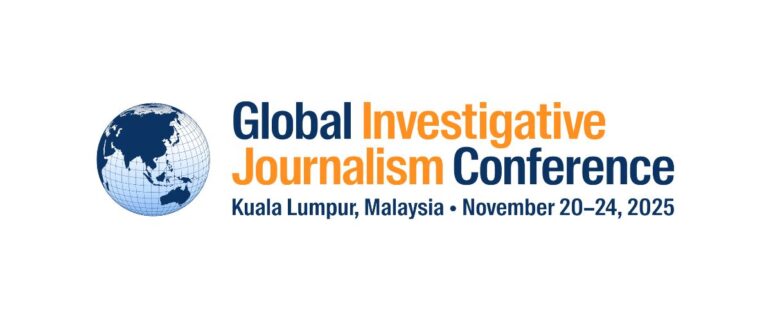

Image: GIJN
GIJC25 Program Sneak Peek — Can’t Miss Expert Panels and Workshops
Read this article in
With 70 days until the kickoff of the 14th Global Investigative Journalism Conference in Malaysia, the full program for the event is taking its final shape. With more than 300 esteemed journalists, data gurus, and world renowned experts committed as speakers so far — nearly 100 of which are from the host continent, Asia — the geographic diversity and subject matter knowledge at GIJC25 will be unsurpassed.
To give both those already registered and prospective attendees a glimpse at just some of the conference’s 15 tracks and more than 150 sessions, we are sharing a few of the many new and innovative panels and workshops planned below.
Data Track
- Connecting the Dots: Investigating in Data-Scarce Contexts
Journalists in data-scarce environments face unique challenges due to government restrictions on information access and lack of infrastructure. This panel, moderated by Code for Africa’s chief data officer, Italian journalist Jacopo Ottaviani, showcases innovative methodologies that combine rigorous fieldwork with open source research to uncover hidden stories. As speakers, Kenyan data journalist Purity Mukami, ARIJ Executive Editor E’thar AlAzem, and Teodora Ćurčić from BBC Serbia demonstrate practical techniques for gathering data in restrictive contexts, integrating satellite imagery analysis with on-the-ground reporting, and building compelling investigations from fragmented sources. Through real case studies, attendees learn innovative strategies for data collection, verification methods for unofficial sources, and workflows that succeed despite limited resources.
Tech Track
- Cracking the Black Box: Investigating Algorithms
Algorithms are behind some of the most common, helpful applications we use, as well as some of the greatest harms such as systemic bias and unjust claims denial — yet their processes are often hidden from view. In this key panel, moderator Karol Ilagan of the Pulitzer Center, along with speakers Karen Hao, an AI expert and freelance journalist, Jasper Jackson, managing editor of the Transformer, and Gabriel Geiger, investigative reporter at Lighthouse Reports, share tools and techniques needed to investigate these technologies and their integration into society and tips to track AI supply chains and cascading harms, particularly in the Global South.
Environment Track
- Investigating the Global Water Crisis Through a Local Lens
The global water crisis isn’t a future threat — it is devastating communities now. Through compelling case studies, investigative journalists like 7iber Executive Editor Lina Ejeliat from Jordan, Ruido Editorial Director Edgardo Litvinoff from Argentina, and Egyptian freelance reporter Eman Mounir share investigative methodologies for exposing complex water stories and holding powerful actors to account, including tips for overcoming access challenges in sensitive environments and translating local crises into narratives that drive change. Moderated by Colombian environmental journalist Andrés Bermúdez Liévano from El CLIP, this panel also offers practical takeaways on corporate accountability and government failures, plus strategies for impactful storytelling on environmental justice.
Nonprofit & New Models Track
- Rebuilding Trust: Connecting with Local Communities
In an era of declining trust in journalism, this panel, moderated by the Pulitzer Center’s Rozina Breen, explores how media organizations can rebuild credibility by integrating citizen monitors and local communities into investigative processes. Panelists include Nigerian investigative journalist and Centre for Collaborative Investigative Journalism (CCIJ) member Olugbenga Adanikin, editor Noelia Esquivel from Costa Rica’s La Voz de Guanacaste, and Kazakh journalist Lukpan Akhmediarov offering practical engagement strategies and risk management techniques for involving communities in monitoring government spending, public contracts, and abuse of power. Through real-world examples, attendees learn how collaborative journalism enhances local impact, builds audience loyalty, and creates sustainable accountability mechanisms that benefit both newsrooms and the communities they serve.
Human Rights Track
- Investigating War Crimes in Different Contexts and Regions
Across theaters of conflict from Sudan to Palestine, gathering and analyzing evidence of war crimes poses a similar challenge. In this session, Media Support International advisor Henrik Grunnet acts a moderator to look at common problems with this subject matter: What methods can keep reporters, sources, and chains-of-custody safe? How can reporters counter active efforts to deny documentation and the gathering of testimonies, or report from afar? Is it ethically justifiable to use undercover techniques, and pose as someone else to extract key information? Insights into these questions and trusted methods for holding war criminals accountable come from panelists who have lived and worked on the front lines of conflict, like Yevheniia Motorevska, who leads The Kyiv Independent’s war crimes investigations unit, Myanmar Now multimedia journalist Su Chay, and Hadi Al Khatib, co-founder of Mnemonic’s Syrian Archive project.
Crime & Corruption Track
- Uncovering Stories Connected to Religious Groups
Religious groups are often able to commit abuses under secrecy, using spiritual authority as control mechanisms. Investigating these cases often requires convincing traumatized victims and systematizing complex information. Moderator Anton Harber, of South Africa’s Henry Nxumalo Foundation, brings together Colombian reporter Juan Barrientos, Radio New Zealand’s Anusha Bradley, and Peruvian investigative journalist Paola Ugaz to discuss methodologies for building trust with sources, navigating institutional resistance, and developing compelling narratives from sensitive testimonies. They will also share their challenges, including legal harassment and persecution, while revealing creative approaches for accessing key information.
Business Track
- How to Investigate Oligopolies in the Pharmaceutical Industry
This workshop, featuring Salud con Lupa Director Fabiola Torres and Australian reporter Will Fitzgibbon of The Examination, teaches journalists how to investigate oligopolies in the pharmaceutical industry that restrict access to essential medicines through high pricing and market manipulation. Participants learn to uncover price-setting mechanisms, expose patent extensions and lobbying tactics, reveal conflicts of interest, regulatory capture, and barriers to generic competition. The session provides practical tools for investigating complex market structures, holding pharmaceutical companies accountable, and informing policy debates that can improve healthcare access and affordability globally.
Safety & Security Track
- Tech Risk Mitigation: Preparing for Device Search and Seizure
In an era of increasing digital surveillance and authoritarian crackdowns on press freedom, journalists face unprecedented risks when crossing borders, covering protests, or working in conflict zones. The search and seizure of electronic devices has become a primary tool for intimidation, source exposure, and censorship. Through real-life case studies and hands-on scenarios, panelists Raya Sharbain of The Tor Project and Citizen Lab’s Bill Marczak offer preventative measures, response protocols during seizure, and demystify what happens to seized devices: how they’re unlocked, searched, what data is extracted, and potential worst-case scenarios.
General Track
- Editorial Leadership Best Practices for Cross-Border Collaborations
Cross-border collaborative journalism can uncover stories that individual newsrooms cannot tackle alone. However, the success of these ambitious projects often hinges on skilled editorial leadership that can navigate complex logistical, cultural, and professional challenges. This esteemed panel, moderated by Correctiv Editor-in-Chief Justus von Daniels, brings together veteran newsroom leaders like Arena for Journalism in Europe Co-founder Brigitte Alfter, ICIJ Executive Director Gerard Ryle, El CLIP Co-founder María Teresa Ronderos, and CENOZO Coordinator Arnaud Ouedraogo to discuss their insights on team building, project management, and the editorial decision-making processes that transform individual reporting into powerful collective storytelling.
Workshops
- Using Domain & IP Data in Your Investigation
- Tracking Aircraft Tied to Narcotics and Corruption
- Using QGIS for Mapping
- Data Magic: Three Simple Ways to Crunch Numbers
- Techniques to Investigate Misinformation and Social Media
- No-Code Data Scraping Tool Kit
- Fundamentals for Novice Data Journalists
- Satellite Imagery for Investigations – Hands-on Class
- Pixel Logic: Investigating AI Deepfakes
- Fixing and Organizing Datasets with AI









